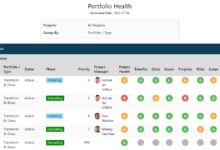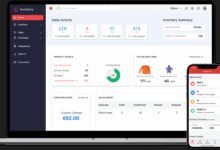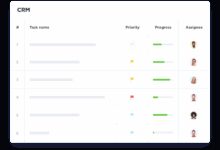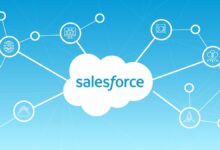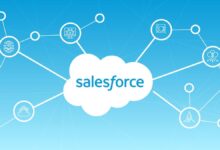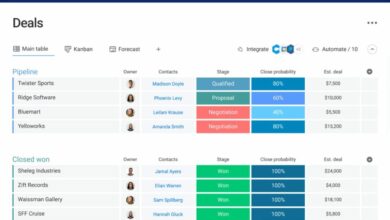Salesforce alternative for enterprise: Top 7 Powerful Salesforce Alternative for Enterprise in 2024
Looking for a powerful Salesforce alternative for enterprise? You’re not alone. As businesses scale, many discover that Salesforce’s complexity and cost don’t always align with their needs. This guide explores the top enterprise-ready alternatives that offer superior flexibility, affordability, and innovation.
Why Enterprises Are Seeking a Salesforce Alternative for Enterprise

While Salesforce has long dominated the CRM space, especially among large organizations, a growing number of enterprises are reevaluating their CRM strategies. The reasons range from cost inefficiencies to integration bottlenecks and user dissatisfaction. As digital transformation accelerates, companies need platforms that are not only scalable but also agile and intuitive.
Rising Costs and Licensing Complexity
Salesforce is renowned for its robust features, but its pricing model can become prohibitively expensive as companies scale. Licensing is often bundled in complex tiers, making it difficult for enterprises to pay only for what they use. Additional costs for add-ons, storage, and premium support can quickly inflate the total cost of ownership (TCO).
- Annual contracts with limited flexibility
- Hidden fees for API calls and data exports
- Costs escalate with user count and feature access
According to Gartner, over 60% of enterprises report that Salesforce licensing costs exceed initial projections within the first two years of deployment.
Integration and Customization Challenges
Despite its ecosystem, integrating Salesforce with legacy systems or niche enterprise tools can be a technical nightmare. Custom workflows often require extensive development using Apex or Lightning, increasing dependency on specialized developers.
- Slow API response times under high load
- Customizations can break during updates
- Limited native support for certain ERP or supply chain platforms
“We spent six months integrating Salesforce with our SAP system, only to find that real-time sync wasn’t reliable,” said a CIO at a Fortune 500 manufacturing firm.
Top 7 Salesforce Alternative for Enterprise: In-Depth Comparison
Choosing the right CRM is a strategic decision. Below is a comprehensive analysis of the seven most compelling Salesforce alternative for enterprise, evaluated on scalability, integration, pricing, and user experience.
1. Microsoft Dynamics 365
Microsoft Dynamics 365 stands out as a leading Salesforce alternative for enterprise due to its deep integration with the Microsoft 365 ecosystem. It’s particularly attractive for organizations already using Azure, Office 365, or Power Platform.
- Seamless integration with Outlook, Teams, and SharePoint
- Power BI for advanced analytics and reporting
- AI-driven insights via Azure Cognitive Services
Dynamics 365 offers modular pricing, allowing enterprises to adopt only the components they need—such as Sales, Customer Service, or Field Service. This flexibility reduces waste and improves ROI. Learn more at Microsoft’s official site.
salesforce alternative for enterprise – Salesforce alternative for enterprise menjadi aspek penting yang dibahas di sini.
2. Oracle CX Sales
Oracle CX Sales is a robust contender, especially for enterprises deeply embedded in Oracle’s ecosystem. It excels in handling complex sales cycles and offers strong back-office integration with Oracle ERP and HCM.
- End-to-end visibility from lead to cash
- Advanced forecasting powered by machine learning
- Global compliance and data residency support
Oracle’s unified data model ensures consistency across CRM, ERP, and supply chain systems. For multinational corporations, this reduces data silos and enhances governance. Explore Oracle’s offerings at Oracle CX Sales.
3. SAP Sales Cloud
SAP Sales Cloud is a natural fit for enterprises already using SAP S/4HANA or SAP ERP. It provides deep integration with financials, logistics, and procurement, making it ideal for manufacturing, retail, and distribution sectors.
- Real-time synchronization with SAP backend systems
- Predictive lead scoring and opportunity management
- Embedded analytics with SAP Analytics Cloud
One of SAP’s key advantages is its ability to unify customer data across sales, service, and marketing within a single data fabric. This eliminates the need for third-party middleware. More details at SAP Sales Cloud.
4. HubSpot Enterprise
Once seen as a solution for SMBs, HubSpot has evolved into a credible Salesforce alternative for enterprise with its Enterprise tier. It now supports complex workflows, advanced security, and multi-team collaboration.
- Intuitive UI with drag-and-drop automation builder
- Powerful marketing, sales, and service hubs
- Custom code support and private app development
HubSpot’s strength lies in its ease of use and rapid deployment. Enterprises report faster time-to-value compared to Salesforce, often going live in weeks rather than months. Visit HubSpot Enterprise for pricing and features.
5. Zoho CRM Plus (with Zia AI)
Zoho CRM Plus is a comprehensive suite that bundles CRM with marketing automation, sales force automation, and customer support. Its AI assistant, Zia, provides predictive insights and natural language processing.
- Highly customizable with Zoho Creator and Deluge scripting
- Unlimited users in certain enterprise plans
- Strong API ecosystem and marketplace
Zoho is particularly cost-effective, offering enterprise-grade features at a fraction of Salesforce’s price. It’s ideal for mid-sized enterprises scaling rapidly. Learn more at Zoho CRM.
salesforce alternative for enterprise – Salesforce alternative for enterprise menjadi aspek penting yang dibahas di sini.
6. Pipedrive Enterprise
Pipedrive, known for its visual sales pipeline, has expanded into the enterprise space with advanced automation, security, and API capabilities. It’s a great fit for sales-driven organizations.
- Focus on sales process visualization and pipeline management
- Two-factor authentication and SSO support
- Customizable workflows and role-based permissions
While not as feature-rich in service modules as Salesforce, Pipedrive excels in simplicity and speed. Enterprises using it report higher sales team adoption rates. Check it out at Pipedrive.
7. Freshworks Freshsales Enterprise
Freshsales, part of the Freshworks suite, offers an AI-powered sales CRM with built-in phone, email, and chat. It’s designed for scalability and ease of use.
- Integrated communication channels reduce app switching
- Real-time engagement tracking and deal insights
- GDPR and SOC 2 compliant
Freshsales is particularly strong in customer engagement and onboarding. Its AI features help prioritize leads and automate follow-ups. More info at Freshsales.
Key Features to Look for in a Salesforce Alternative for Enterprise
When evaluating a Salesforce alternative for enterprise, it’s crucial to assess not just feature parity but also strategic alignment with your business goals. Here are the most critical capabilities to prioritize.
Scalability and Performance Under Load
Enterprise CRMs must handle thousands of users, millions of records, and high-frequency transactions without performance degradation. Look for platforms with distributed architecture, auto-scaling, and global data centers.
- Support for multi-region deployments
- SLAs guaranteeing 99.9% uptime
- Benchmarked performance with large datasets
Advanced Security and Compliance
Enterprises operate under strict regulatory environments. Your CRM must support SOC 2, ISO 27001, GDPR, HIPAA, and other compliance standards. Role-based access control (RBAC), data encryption, and audit trails are non-negotiable.
- Single sign-on (SSO) and multi-factor authentication (MFA)
- Data residency options for regional compliance
- Automated compliance reporting
Integration Ecosystem and API Maturity
A CRM is only as powerful as its ability to connect with other systems. Evaluate the availability of pre-built connectors for ERP, marketing automation, e-commerce, and collaboration tools.
salesforce alternative for enterprise – Salesforce alternative for enterprise menjadi aspek penting yang dibahas di sini.
- RESTful APIs with comprehensive documentation
- Support for webhooks and event-driven architecture
- Native integrations with tools like Slack, Zoom, and Shopify
Total Cost of Ownership: Salesforce vs. Alternatives
Cost is a major driver behind the search for a Salesforce alternative for enterprise. While Salesforce offers powerful features, its TCO often surprises organizations.
Breaking Down Salesforce’s Hidden Costs
Beyond the sticker price, Salesforce incurs costs in training, customization, integration, and third-party apps. Enterprises often need to hire Salesforce-certified developers or consultants for even minor changes.
- Average implementation cost: $100,000+
- Annual maintenance: 15–20% of initial cost
- Third-party app subscriptions can double expenses
Cost Comparison of Top Alternatives
Most Salesforce alternatives offer transparent, modular pricing. For example:
- Microsoft Dynamics 365: $210/user/month (Enterprise edition)
- Oracle CX Sales: Custom pricing, but typically 20–30% lower than Salesforce
- HubSpot Enterprise: $1,200/month for up to 10 users, then $100/user
- Zoho CRM Plus: $52/user/month (billed annually) with unlimited users in some plans
When factoring in implementation and maintenance, enterprises report 30–50% savings by switching to alternatives like Zoho or HubSpot.
Implementation and User Adoption: Why It Matters
Even the most powerful CRM fails if users don’t adopt it. Salesforce’s complexity often leads to low user engagement, especially among non-technical sales teams.
Reducing Implementation Time
Traditional Salesforce deployments take 6–12 months. Alternatives like HubSpot and Zoho can be configured in 4–8 weeks due to intuitive interfaces and pre-built templates.
- Drag-and-drop workflow builders
- Pre-configured industry templates
- Self-service setup for common use cases
Boosting User Adoption Rates
User experience directly impacts CRM success. Platforms with mobile-first design, AI assistance, and minimal training requirements see higher adoption.
- HubSpot reports 85%+ user adoption within first 90 days
- Zia AI in Zoho reduces manual data entry by 40%
- Pipedrive’s visual pipeline increases daily logins by 60%
“Our sales team resisted Salesforce for years. With HubSpot, they started using it voluntarily within a week,” shared a sales operations manager at a tech firm.
Future-Proofing Your CRM Strategy
Choosing a Salesforce alternative for enterprise isn’t just about replacing a tool—it’s about future-proofing your customer engagement strategy.
salesforce alternative for enterprise – Salesforce alternative for enterprise menjadi aspek penting yang dibahas di sini.
AI and Automation Capabilities
The next generation of CRM is driven by artificial intelligence. Look for platforms with built-in AI for lead scoring, sentiment analysis, and predictive forecasting.
- Microsoft Dynamics 365 uses AI to recommend next-best actions
- Oracle Adaptive Intelligence predicts churn and upsell opportunities
- HubSpot’s AI content assistant drafts emails and sequences
Headless and Composable CRM Architectures
Modern enterprises are moving toward composable architectures—where CRM components can be mixed and matched like building blocks. This allows greater flexibility than monolithic platforms like Salesforce.
- API-first design enables custom front-ends
- Microservices architecture improves scalability
- Integration with customer data platforms (CDPs)
Sustainability and Vendor Roadmap
Consider the vendor’s long-term vision. Are they investing in innovation? Do they have a clear product roadmap? Companies like Microsoft and Oracle are integrating their CRMs with metaverse and IoT strategies, ensuring relevance for years to come.
Real-World Case Studies: Enterprises That Switched
Real-world examples demonstrate the tangible benefits of adopting a Salesforce alternative for enterprise.
Manufacturing Giant Migrates to SAP Sales Cloud
A global manufacturer with 15,000 employees switched from Salesforce to SAP Sales Cloud to unify sales and logistics. The integration with S/4HANA reduced order-to-cash cycle time by 30%.
- Eliminated 5 middleware tools
- Improved forecast accuracy by 25%
- Reduced IT support tickets by 40%
Tech Company Adopts HubSpot Enterprise
A SaaS company with 500 employees migrated from Salesforce to HubSpot Enterprise to improve marketing-sales alignment. The unified platform enabled seamless handoffs and campaign tracking.
- Campaign ROI increased by 35%
- Sales cycle shortened by 18 days
- Marketing team gained full visibility into deal stages
Retail Chain Chooses Zoho CRM Plus
A retail chain with 200 stores adopted Zoho CRM Plus to manage customer loyalty and field sales. The AI-powered Zia assistant automated follow-ups and inventory alerts.
- Customer retention improved by 22%
- Field sales productivity increased by 30%
- Annual CRM cost dropped from $300K to $90K
How to Evaluate and Migrate to a Salesforce Alternative for Enterprise
Migrating from Salesforce is a significant undertaking, but with the right approach, it can be smooth and rewarding.
salesforce alternative for enterprise – Salesforce alternative for enterprise menjadi aspek penting yang dibahas di sini.
Step 1: Assess Your Current CRM Pain Points
Conduct stakeholder interviews to identify what’s not working. Is it cost? Usability? Integration? Performance? Document specific use cases and requirements.
Step 2: Define Success Metrics
Establish KPIs such as user adoption rate, sales cycle length, customer satisfaction, and TCO reduction. These will help measure the success of your new CRM.
Step 3: Run a Pilot with Top Contenders
Shortlist 2–3 platforms and run a 60-day pilot with a small team. Test data migration, integration, and daily workflows. Gather feedback from end-users.
Step 4: Plan Data Migration and Integration
Use ETL tools or vendor-assisted migration services to transfer data securely. Ensure data cleansing and deduplication before import.
Step 5: Train Users and Drive Adoption
Invest in change management. Provide role-based training, create internal champions, and use gamification to encourage usage.
What are the main reasons enterprises look for a Salesforce alternative for enterprise?
Enterprises seek alternatives due to high costs, complex licensing, integration challenges, poor user adoption, and the need for more flexible, modern architectures. Many also want deeper ERP integration or simpler user experiences.
Which Salesforce alternative for enterprise is the most cost-effective?
salesforce alternative for enterprise – Salesforce alternative for enterprise menjadi aspek penting yang dibahas di sini.
Zoho CRM Plus and HubSpot Enterprise are among the most cost-effective, offering enterprise-grade features at significantly lower price points than Salesforce, especially when factoring in implementation and maintenance.
Can these alternatives handle large-scale deployments?
Yes. Platforms like Microsoft Dynamics 365, Oracle CX Sales, and SAP Sales Cloud are built for global enterprises with thousands of users and complex data environments. They offer enterprise-grade security, scalability, and support.
Is user adoption better with these alternatives?
Generally, yes. Alternatives like HubSpot, Pipedrive, and Zoho offer more intuitive interfaces, leading to faster onboarding and higher daily usage. This reduces reliance on extensive training and support.
How long does it take to migrate from Salesforce to another CRM?
Migration timelines vary. Simple migrations can take 4–8 weeks, while complex ones with extensive customizations may take 3–6 months. Proper planning and pilot testing can accelerate the process.
Choosing the right Salesforce alternative for enterprise is a strategic move that can enhance efficiency, reduce costs, and improve user satisfaction. While Salesforce remains a powerful platform, it’s no longer the only option for large organizations. From Microsoft Dynamics 365 to HubSpot Enterprise and SAP Sales Cloud, today’s alternatives offer compelling combinations of integration, usability, and innovation. By evaluating your specific needs, running pilots, and focusing on total cost of ownership, your enterprise can find a CRM that truly aligns with your long-term goals. The future of enterprise CRM is not just about features—it’s about flexibility, intelligence, and user-centric design.
salesforce alternative for enterprise – Salesforce alternative for enterprise menjadi aspek penting yang dibahas di sini.
Further Reading:
